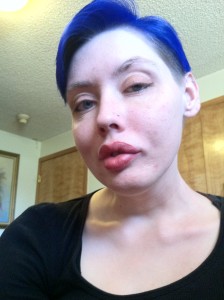 By FSH Society Ambassador Trisha Sprayberry
By FSH Society Ambassador Trisha Sprayberry
I’m sure everyone knows about the ALS ice bucket challenge: folks dousing themselves with icy buckets of water for ALS. This campaign took off nationally with some major celebrities dressing down and ice-bucketing themselves to rally the country and raise millions toward research on ALS.
Last summer, Max Adler, the actor from “Switched at Birth” and “Glee”, as well as honorary board member of the FSH Society, fronted the #FSHDselfies campaign. He was not just a spokesperson for FSHD and the FSH Society. Max has personally been affected, with family ties to the disease.
There are many reasons why one disease or cause gets the spotlight while so many others languish in the shadows. Even with Mr. Adler’s support and celebrity endorsement, it’s difficult for the FSHD community to have our voices heard and our cause supported.Sometimes this is because our issues are just not grabbing public attention. But we also need to acknowledge other challenges we face. For example, there are many advocates who are impassioned to bring awareness and support research toward finding a cure. But often, self-advocates risk being dismissed as being narcissistic for advocating their own stories, or for complaining over issues that an unsympathetic public may deem entitlements, rather than as issues of equality. The fear of being judged, embarrassed, flamed and even retaliated against, keeps many from advocating for themselves or for a cause.
Also, FSHD manifests physically. Not everyone who shows symptoms of FSHD is comfortable with going “public” and being open about how FSHD has altered them physically. Loss of the ability to smile or emote, as well as scapular winging and atrophied arms and legs are symptoms we usually hide beneath clothes. We’re afraid to be seen as weak or defective, so we stay in the closet.
But you see, advocacy and finding a cure don’t happen by themselves. Maintaining a stiff upper lip in spite of the limitations of your condition may help you get through your day, but it doesn’t help change the world.
We all need to come together, share our stories, and unite our voices so that we can increase awareness and support for a cure to become a reality. As an Ambassador for the FSH Society, I advocate not only for myself, but also for my daughter, my family, and the roughly 870,000 people who live with FSH Muscular Dystrophy.
And so can you. Whether you are a person who has FSHD, or a friend or a loved one to someone living with FSHD, or just someone lending a helping hand to support a worthy cause, I encourage you all to become advocates too and to share your own stories, images, and experiences publicly.
Trisha is raising awareness by contributing stories to the Huffington Post. She also makes and sells “message in a bottle” charms to spread awareness and raise funds for the FSH Society! You can purchase it on eBay. Click here.


That’s a good advocate. Only by making the disease and its present situation known by more people and organizations, is there the possibility to get research attention.